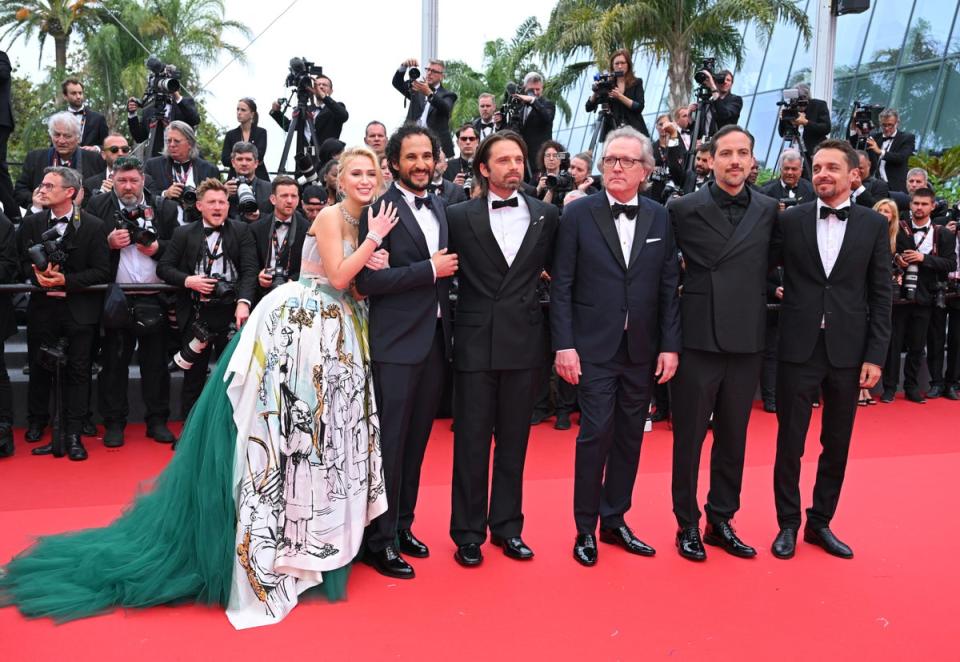The Apprentice review roundup: What critics are saying about docudrama on Donald Trump’s early years

The highly anticipated docudrama on Donald Trump’s early life premiered at the 77th Cannes film festival on Monday, to a standing ovation from the audience, mixed reviews from critics, and a possible lawsuit from the former US president’s campaign.
The Apprentice, directed by Iranian-Danish filmmaker Ali Abbasi, stars Sebastian Stan as Trump and follows his rise through the business world.
The central relationship is between Trump and Roy Cohn, played by Jeremy Strong, the attorney who was chief counsel to Joseph McCarthy’s 1950s Senate investigations.
The Hollywood Reporter said scenes showing Trump getting liposuction and his alleged rape of first wife Ivana drew “audible gasps” from the audience and the film received an enthusiastic applause with the crowd “staying on their feet for nearly eight minutes”.
Pete Hammond from Deadline describedThe Apprentice as a “smart, sharp and surprising origin story”. “This exceptionally well-researched first screenplay by Gabriel Sherman, who had profiled Trump for various publications and thought the Trump-Cohn story would make a good movie, has turned out a tale that is essentially a Faustian deal between the two,” he wrote.
“Although they have both been described as monsters in different circles, they are really given an empathetic treatment here, at least in part, and at least in an attempt to show us what led to historical change in America, and what may well continue in a story whose end has yet to be written.”
Variety’s Owen Gleiberman feels that the drama “is a spirited, entertaining, and not overly cheeky docudrama about the years in which Donald Trump came to be Donald Trump” and adds that it’s “sharp and scathing but it avoids cheap shots”.
He writes that the film details a series of heartless actions Trump makes – turning on his alcoholic brother, allegedly sexually assaulting Ivana, discarding Cohn who at this point has Aids º but not “where the Sociopath 3.0 side of Trump comes from,” which makes the end of the film “far less interesting” compared to how it starts.

David Rooney at The Hollywood Reporter praises Stan’s performance, writing that “the actor does an excellent job, going beyond impersonation to capture the essence of the man. In a character study of a public figure both widely parodied and unwittingly self-parodying, Stan gives us a more nuanced take on what makes him tick”.
Kevin Maher of The Times starts by writing that this is ”the Donald Trump movie that you never knew you needed: full of compassionate feeling yet ruthless in analysis”.
Stan gets high praise from Maher as well.
It is “difficult to overstate how nuanced Stan is here and how his portrait of Trump evolves in physical gestures and familiar mannerisms (saying “loser”) without becoming an Alec Baldwin-style caricature”, he writes.
However, The Guardian’s Peter Bradshaw writes that Trump’s depiction “is almost sentimental, a cartoon Xeroxed from many other satirical Trump takes and knowing prophetic echoes of his political future”. He praises Strong’s performance as Roy Cohn, describing his “strange physical stillness and lizardly stare” as “much more interesting and effectively threatening” than Stan’s “moderate hair-and-makeup performance” as Trump.
The Telegraph’s Robbie Collin calls the film a “character study with very little character to study”.
“But the particular nature of its subject’s psychology renders the drama – how to put this tactfully? – rather short on depth and twists. Spoiler alert: the young Donald Trump was a cripplingly insecure and status-conscious wannabe whose big life goals amounted to getting rich, getting laid, and worming his way into his city’s billionaire social elite.”


